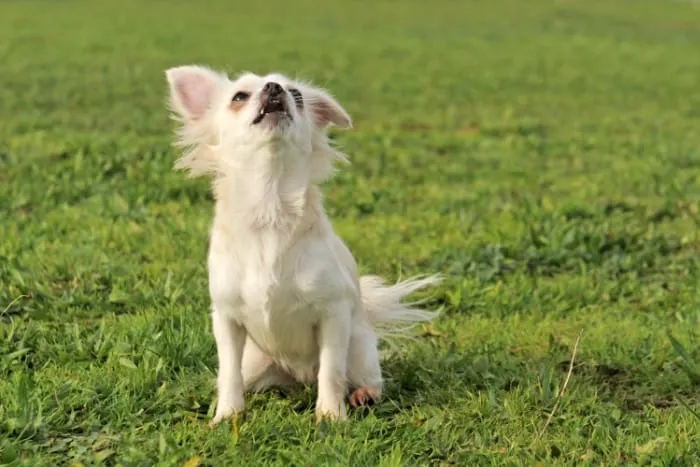THE YAPPING CHIHUAHUA: HELPING THE EXCESSIVE BARKER
Small breed dogs, especially Chihuahuas, are well known for their habits of barking more than their larger brethren.

Barking at sounds, people, other dogs, the doorbell, and even when left home alone can become embarrassing, annoying, and uncomfortable for the humans in the household.
Neighbors may become upset when your Chihuahua barks throughout the day, and guests can feel startled as your Chihuahua rushes at them in a mad, barking fit.
It’s not easy but you can help your little dog resolve their barking problems, but first, you should understand the reasons why they bark. Reactive barking is one possibility as your Chihuahua barks at things he fears.
Barking can even be a release behavior for a bored or anxious dog when left home alone. Resource guarding is another cause of unnecessary barking. You can help your Chihuahua through them all!

THE CAUSE OF BARKING
Dogs don’t bark to talk the way humans do. Each bark does not translate into words like noises from human vocal cords. But you will notice that the barking does sound different depending on the situation.
You also need to read their behavior, including body language, during the barking event. This way, you can learn if they a fearful, such as exhibiting fear aggressive body posture or if something else is going on. He may be barking out of excitement or boredom, too. To get the full picture, you also need to read the context in which he is barking.
The context is his environment and what is going on around him. If your Chihuahua barks when someone knocks on the door, then he could be barking at a scary noise or the anticipation of guests. If it is the noise, then he has a reactive behavior that can be corrected with counter-conditioning.
If he is barking out of excitement to greet guests, then he can be trained to remain calm and relax in a designated place until allowed to greet everyone. Even barking that seems aggressive is usually coming from fear, and counter-conditioning can really help your Chihuahua feel more comfortable and confident during his trigger.
If you cannot pinpoint your Chihuahua’s trigger, then don’t try and train him out of barking on your own. Get help from a professional trainer to take out the guesswork on your part and help solve your dog’s behavioral problem.
Sometimes a trigger may be difficult to pinpoint if your dog seems to bark at everything. He may have many triggers that stem from improper or no socialization as a young puppy.
Socialization can be a very tricky thing to get the hang of for new owners and owners that have not learned the right way to do it to benefit their pet. Socialization means more than just meeting people and dogs. In fact, if you attempt to let strangers pat your dog’s head and other dogs sniff his rear when he does not want it, you can cause your dog to become a problem-barker quickly!
Socialization is not the one and only reason that dogs bark reactively, but it is a high probability when we’re talking about adult Chihuahuas.

Boredom
If your chihuahua is bored, then the barking could also be known as “boredom barking.” These are often higher-pitched barks that happen in intervals. Chihuahuas are considered pack animals and are quite social, so when they get bored and don’t have any stimulation, they can begin to develop behavioral problems – like barking.
To curb this behavior, ensure that your dog has both mental and physical stimulation throughout the day. You can teach them new tricks, take them for a walk, or play tug of war, for example. You should also not leave them alone for more than six consecutive hours per day, even less if it is a Chihuahua puppy if all possible.
Fear
When your Chihuahua barks out of fear, it is because they feel that there is some kind of threat in their presence. Along with the barking, they may also show a few signs of aggression as well. Their survival instincts begin to kick in and their barks become high-pitched in much shorter intervals.
They may also pull their ears back when threatened, keep their tail low, and their fur may stand up from fear. All of these signs of fear can ultimately lead to someone getting bitten or attacked as the Chihuahua will do what it knows to do naturally when threats are perceived. The threat could be a larger dog, a stranger, a neighbor, or even a small noise. All of this can cause incessant barking.

Wants and Needs
If your pup is hungry, thirsty, or needs to go outside, they may bark to alert their pet parent. Many times, they will go to the door where you usually let them out and bark to let you know it is time to go outside.
They may also bark simply for your attention. These barks are usually a lot shorter and a lot softer than other barks. Once you are able to meet the wants and needs of your Chihuahua, the barking will most likely cease.
Protective or Dominant
If there is another dog around, your Chihuahua may get defensive and want to protect its territory. They will bark and exhibit other behaviors to show other animals that this is their domain. They may bark when it comes to their home, their crate, bed, toys, and food. These barks are typically loud and aggressive and can result in someone or another animal getting bit or attacked.
Your Chihuahua expressing this kind of dominant behavior and barking problem in the home can lead to other bad behavior if it is not addressed.
Separation Anxiety
This is a common behavioral problem for many dog breeds. Chihuahuas want to be with their pet parent, so when you go and leave them alone, they begin to feel separation anxiety.
This kind of anxiety can cause them to become seriously stressed. They may bark when you leave and act out when they find out they have to stay at home without you.
Dementia
If you have an older dog, then they may experience some cognitive dysfunctions that cause the barking. Dementia is an example. This disorder can cause excessive barking and can cause your pup to start barking for really no reason at all.
When you have an older dog that barks because of dementia, there really isn’t any kind of training that can help the behavior. Instead, call them by name, comfort them, and keep them as calm as possible.
Talk to your vet about it too as they may be able to prescribe to help your dog calm down or lessen the dementia symptoms.

Pain or Discomfort
If barking comes with other signs of distress, a vet visit is crucial to rule out medical problems.
How Bad is the Barking?
While barking alone isn’t necessarily always a bad thing, you need to determine how bad it is. All dogs bark to communicate along with other physical cues like eye gazing, showing their teeth, and growling.
Some of the more acceptable reasons for barking include when your pup wants food or water, needs to go outside, or they sense an intruder.
However, inappropriate barking is also a thing that occurs if your pup barks incessantly at pedestrians, passing cars, guests, postal workers, delivery drivers, neighbors, other animals, and objects like your vacuum or broom while you are cleaning.
All of this inappropriate barking can also cause problems in your everyday life like cause sleep disturbances, upset the neighbors, and cause more stress in the household.
END PROBLEM BARKING
First of all the thing you don’t want to do is something most of us (including me) naturally want to do and that is yell at our dog to shut up. When you yell, they think you are joining in with them in barking and it gets them more worked up.
You can stop your dog’s needless barking using positive reinforcement during brief training sessions.
Always start any new training session in a quiet and familiar place, if possible. For example, if your Chihuahua’s barking is directed at a door knock, then start sitting some distance away from your door at a distraction-free time of day.
Knock once on the wall or your floor, and immediately give your dog a bite of a high-value treat, like real meat or cheese. Provide the reward before they get the chance to start barking. This is one reason for doing only one knock instead of repeated knocks in the beginning.
Do this for about 5 minutes. You want your dog to begin to expect a treat after every knock they hear. The knock should be a precursor to receiving a reward. Counter conditioning such as this is a method of changing your dog’s emotions about his trigger.

If knocking scares them, then starting with short, calm training sessions with high-value treats will help them to begin feeling positive about their trigger. However, their behavior will not change overnight. In fact, it can take weeks to months before they are totally comfortable.
Keep in mind that his reactive barking has become a self-reinforcing behavior. He does it because he is unsure about what is happening when he hears the knock.
Continuing to build your dog’s confidence during knocking, in your following sessions begin to knock a little louder and maybe 2 to 4 knocks at a time. Build up to this slowly and at your dog’s pace, not your own! If they begin to bark during your sessions, you know that you have moved too fast.
In time you will be able to knock on your door like a guest would and reward your dog for not barking! In the meantime, keep your dog in a quiet and safe room away from the noise when you are expecting company.
If it is a doorbell instead of a knock that sets off your dog’s yapping, try to obtain a recording of the sound that you can play on your phone, or tablet with full control. Start with the sound very low and gradually make it louder until you can ring the doorbell for real!
Eliminating reactive barking at other dogs and strangers requires you and your dog to take a walk or go someplace you normally would in which they would bark. However, be sure to have the highest value treat available on hand. Let them know you have it!
Stay at a safe distance from their trigger but allow them to see it. Every time they see it, give them the treat. Hopefully, they will be rewarded before the barking starts, but even if they do throw off a round of barks and growls, try to treat them anyway. Remember, the trigger should always be a precursor to a reward!
I like this video on how to stop barking:
and this one too:
Some other things that have worked for others are to fill a spray bottle with water and spray them when they bark or fill a soft drink can with rocks or coins about a quarter-way full and tape the top shut. When your dog barks, shake the can.
Both of these methods are not considered positive reinforcement but use being startled as a way to distract them from the barking behavior.

GIVE IT TIME
Changing a dog’s behavior from problem barking to being a calm and happy dog takes time, commitment, and consistency from you. Give yourself and your dog, a break from the nerve-wracking barking, start training him today!
ALSO READ:
Decoding Your Rescue Chihuahua’s Behavior
How to Interpret Your Dogs Bark
Teaching Your Dog Not to Bark At People and Pets

Cathy Bendzunas
Pet Blogger


John Trudeau
Sunday 13th of August 2023
We had problems with barking until we bought a sound making device that makes a sound that the dog doesn't like. It is very rarely used at times all I have to do is show it to him to get him under control. The barking was so bad that we thought we were going to be kicked out of the provincial park we were staying at. It has been a life changing for are Chihuahua we can go out and walk around other dogs and humans.
Cathy Bendzunas
Sunday 13th of August 2023
I always wondered if those things worked. Thanks for letting us know John.
Alpianshusta Exotlopnari
Monday 22nd of February 2021
Do these articles work for half-chihuahuas,too?
Cathy
Monday 22nd of February 2021
Yes, they are for half chis too.
Jack reed
Wednesday 11th of September 2019
Need a home for two girls I have room for two.
Alpianshusta Exotlopnari
Monday 22nd of February 2021
@Cathy,I like what you said,but maybe both? Like,they have 4 girls,but they only have room for 2,and they need a home for 2?
Cathy
Wednesday 11th of September 2019
Not sure I understand. Are you saying you have room for 2 girls or you need to find another home for 2 girls?
Thursday 6th of December 2018
My female chi, Jojo is now 6 months old. She used to love everyone she met but now barks like crazy at every stranger. Today she bared her teeth at the little girl next door when she approached. I really don't know what to do about it. We used to walk a lot and she was used to strangers but winter has set in and we are housebound. Any suggestions?
Cathy
Friday 7th of December 2018
She's a beautiful puppy! Yeah now is the time to stop this behavior before it gets out of hand. A dog training class would help both of you. Also check out the 2 videos on this page. Of course your puppy isn't as bad as the dog in the videos but it does help show how trainers handle this:
https://ilovemychi.com/aggressive-chihuahuas-vs-dog-trainer/
Julie
Tuesday 24th of October 2017
My Bella simply loves to bark. I think she loves the sound of her voice. She loves to run out into the yard running around barking and strutting her stuff. She barks at everything. I mean everything. And she barks at nothing. I gave up trying to make her stop.
Cathy
Wednesday 25th of October 2017
That seems to be a chi trait. They do love to bark. I think it makes them feel bigger.